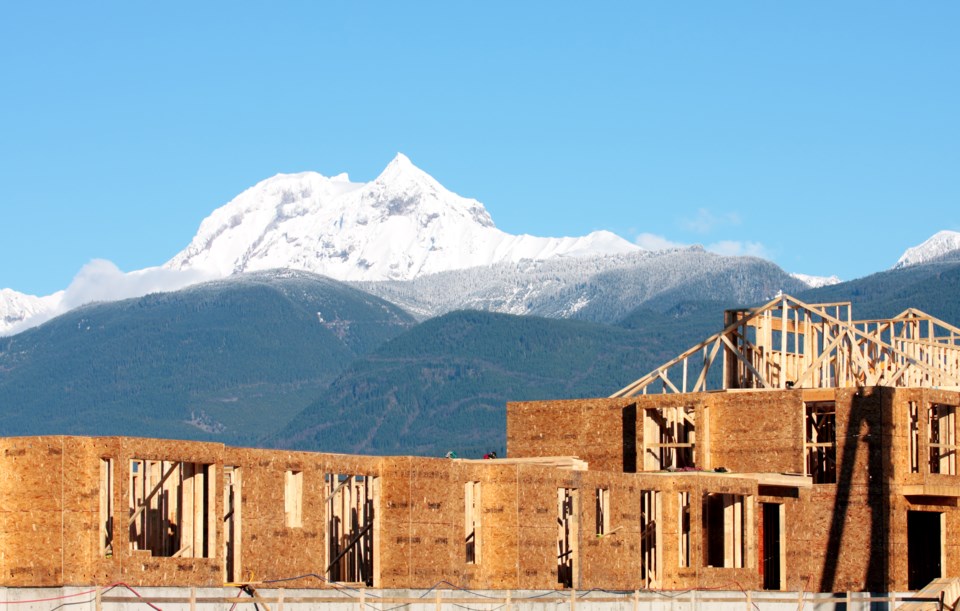The Resort Municipality of Whistler (RMOW) is looking to modernize its 21-year-old building bylaw and associated fee structure, a move intended to streamline a permit approval process local builders have called inefficient and confusing.
“It will improve efficiency for staff because everyone will know the rules, whether it’s a builder, the inspection team, the plan review team, and others involved with a permitting closure,” explained Flywheel Building Solutions owner and consultant Ken Kunka, presenting to elected officials at the Nov. 5 committee of the whole meeting.
The existing bylaw, adopted in 2003 with several minor amendments over the years, is “quite outdated,” said the RMOW’s building department manager, Melissa Hollis, “and is creating some barriers for both staff and the community to deal effectively with processing permits and enforcement.”
RMOW staff proposed modelling the new bylaw after the Municipal Insurance Association of BC’s template building bylaw for large cities, which would help clarify the roles and responsibilities of both the municipality and the building permit applicant through the approval process.
“A very well-structured bylaw will provide a story from front to end. Who is involved in a permit? When [do] you need a permit? How do you obtain a permit? What do you need for inspections? How do you close a permit, and what happens if everything goes wrong on the compliancy side?” Kunka said. “Once you have that structure, it’s very easy to start rebuilding permitting systems to follow that process, and you’re eliminating documents.”
The local building community has been vocal about its frustrations with a permitting process it says is overly complicated and time-consuming. In a lengthy letter sent to Pique last month, the Sea to Sky chapter of the Canadian Home Builders Association (CHBA) said members have experienced wait times of nine months just for an initial review of a home renovation project, compared to several weeks in other B.C. jurisdictions. Compounding the issue, according to builders, is that the RMOW will often request additional documents and information months into an application, “seemingly at the whim of whoever happens to be reviewing applications on a given day,” the letter read. In a recent Sea to Sky CHBA survey of primarily builders, 59 per cent of 29 respondents said they are “regularly” asked for additional, previously unrequired information and documentation in the permit application process, with four per cent saying they “always” were.
The bylaw modernization is meant to address the permit backlog, as well as facilitate the RMOW’s planned move to an online application process, which the local CHBA chapter has been pushing for since 2021.
“Rewriting our bylaw policy and making it very clear and concise will support the move to an online application process,” said Hollis. “It will also support our ability to follow a standardization for enforcement. For example, we have challenging situations when permits aren’t closed out.”
Along with the updated building bylaw, staff have proposed creating a separate bylaw that would set out a new permit fee structure, a “shift away from a very traditional way of calculating building permit fees into a more innovative approach,” Hollis said.
Currently, permit fees reflect a percentage of a project’s declared value of construction, “a very contentious subject for many years in the community,” added Hollis. Staff proposed a new fee structure based on a project’s square footage, as well as the permit and building type, a “more transparent and more predictable” approach, she said.
Hollis noted the proposed change would require “a lot of legal input” and, while larger Canadian cities such as Toronto and Calgary have considered a similar approach, it’s a fee structure that has not been implemented anywhere in B.C.
Local builders were critical of the RMOW after it increased building permit fees by 30 per cent in early 2024 despite the sector’s pushback. Staff said it was planning extensive engagement with the local industry on its new bylaw and permit fee structure, but Councillor Ralph Forsyth wanted to take it a step further. He proposed creating a working group with industry members so they could have their say on the new bylaws.
“I’m sick to death of having to play Solomon between our municipal staff and the building community,” said Forsyth. “It is an awkward and terrible position for us to be in. If I have something from a working group that includes members of the building community that say, ‘Yes, we are supportive of these bylaw changes,’ then good. I don’t need to play Solomon anymore.”
Forsyth’s amendment passed 4 to 3, with some councillors questioning whether creating a working group would slow down the process. The RMOW is targeting April for adoption of the new bylaws.






